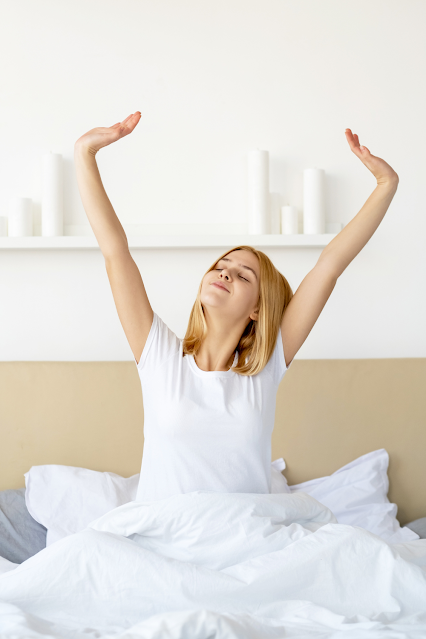Are you having trouble sleeping? You are not alone. Insomnia affects millions of people worldwide and is one of the most common sleep issues that can interfere with your quality of life. Unfortunately, this condition has many potential causes and triggers, ranging from lifestyle choices to medical conditions, making it challenging to identify the source(s). In this blog post, we'll explore some of the primary causes and common triggers associated with insomnia so you can begin to understand more about why you might be unable to get a restful night's sleep.
What is insomnia and how can it affect the quality of life
Insomnia refers to the inability to fall asleep or to stay
asleep for an adequate amount of time. The consequences of insomnia can range
from daytime fatigue to mood disturbances and impaired cognitive function. It
can also limit an individual's ability to perform daily tasks and even affect
their quality of life in the long term. Fortunately, there are ways to
alleviate the symptoms of insomnia, and one of these is by seeking the help of medambien.com for sleeping pills. With the right
medication and guidance, people living with insomnia can improve their quality
of life and get the quality of sleep they need.
Common causes of insomnia
Insomnia can be frustrating and exhausting. The causes of
insomnia are numerous, but some of the most common causes include stress,
genetics, and medication. Stress, in particular, can make it difficult to get
quality sleep, as it causes the mind to race and prevents relaxation. Genetics
may also be a contributing factor, as some people are simply predisposed to
insomnia due to their genetic makeup. Similarly, some medications, including
those used to treat depression or anxiety, can interfere with sleep and cause
insomnia. If you struggle with getting a good night's sleep, it's essential to
understand the root cause of your insomnia and seek help if necessary.
Identifying personal triggers for insomnia
For those who struggle with insomnia, identifying personal
triggers can be a crucial first step toward getting a better night's sleep.
While some triggers may be obvious, such as drinking caffeine late in the day
or using electronics before bed, others may be less clear. Factors like stress
levels, diet, and sleep environment can all play a role in keeping you awake at
night. By taking the time to identify your triggers, you can start adjusting
your habits and routines that may help you finally get the restful sleep you
deserve. Whether it's cutting out late-night snacking or creating a more
peaceful sleep environment, small changes can go a long way in your battle
against insomnia.
The importance of seeking professional help
While occasional sleeplessness is normal, chronic insomnia
can lead to serious health problems such as depression, anxiety, and even heart
disease. That's why seeking professional help for severe cases of insomnia is
crucial. If left untreated, insomnia can disrupt your daily routine, affect
your mood and performance, and even strain your relationships with others. One
option for treatment is through Health2Delivery for sleeping pills.
However, consulting with a healthcare professional before purchasing any
medication is important. They can help you find the right treatment plan for
your specific needs and guide you through the process. Sleeping well is
essential for your well-being, so don't hesitate to seek help if you're
struggling with insomnia.
Self-help techniques
Sleep deprivation can have detrimental effects on both our
physical and mental health. Fortunately, there are several self-help techniques
available to manage sleep deprivation. Firstly, it is crucial to establish a
sleep routine and stick to it, even on the weekends. This helps regulate our
internal clock and ensures we get enough sleep. Another useful technique is to
create a relaxing bedtime routine that can include reading a book, taking a
warm bath, or practising mindfulness exercises. Additionally, limiting caffeine
and alcohol consumption, avoiding screens before bedtime, and ensuring a
comfortable sleep environment can all contribute to a better night's rest.
Remember, taking care of ourselves starts with taking care of our sleep!
Sleep hygiene tips to prevent insomnia
Getting a good night's sleep is vital for our physical and
mental health. However, sometimes, falling asleep can be more difficult than
expected. This is where sleep hygiene comes in. Sleep hygiene refers to the
habits and practices that can help us get a good night's sleep—for example,
creating a comfortable sleep environment, sticking to a sleep schedule,
limiting caffeine and alcohol intake, and avoiding electronics before bed. By
following these tips, we can help prevent insomnia and wake up feeling refreshed
and well-rested. So, if you're struggling with getting enough sleep, try
incorporating some of these sleep hygiene tips into your routine.
Conclusion
From the importance of self-awareness when it comes to
identifying triggers for insomnia to various self-help techniques and sleep
hygiene tips, there's much that can be done to help manage sleep deprivation.
However, if your insomnia persists for an extended period or causes severe
distress in life, then consulting a physician is essential. Many medical
professionals are available with comprehensive resources to help you identify
the root cause of your insomnia and suggest treatments as needed. It's critical
that you take them seriously and strive towards more restful nights. So don't
suffer from insomnia any longer – take action now and enjoy a good night's
sleep!







